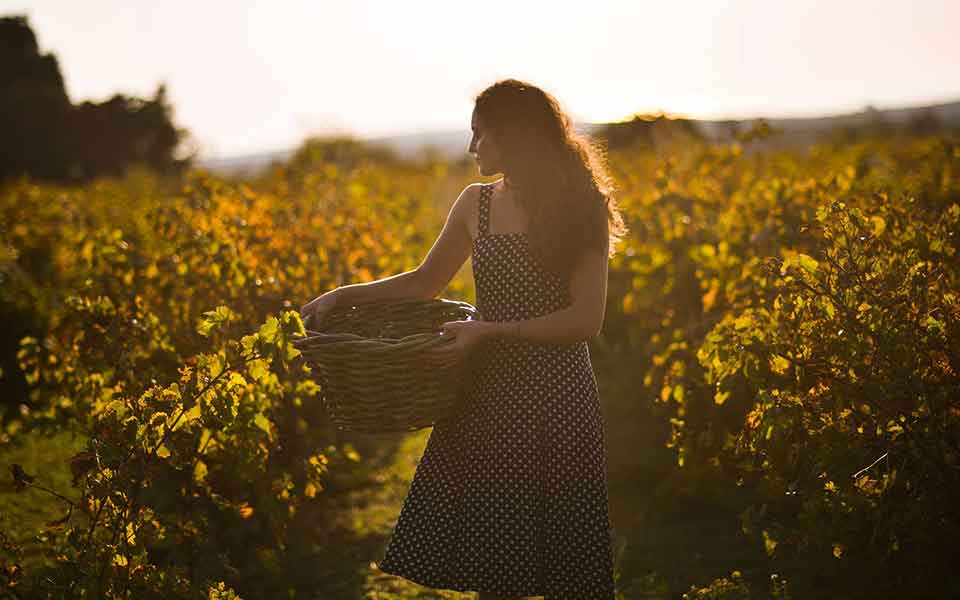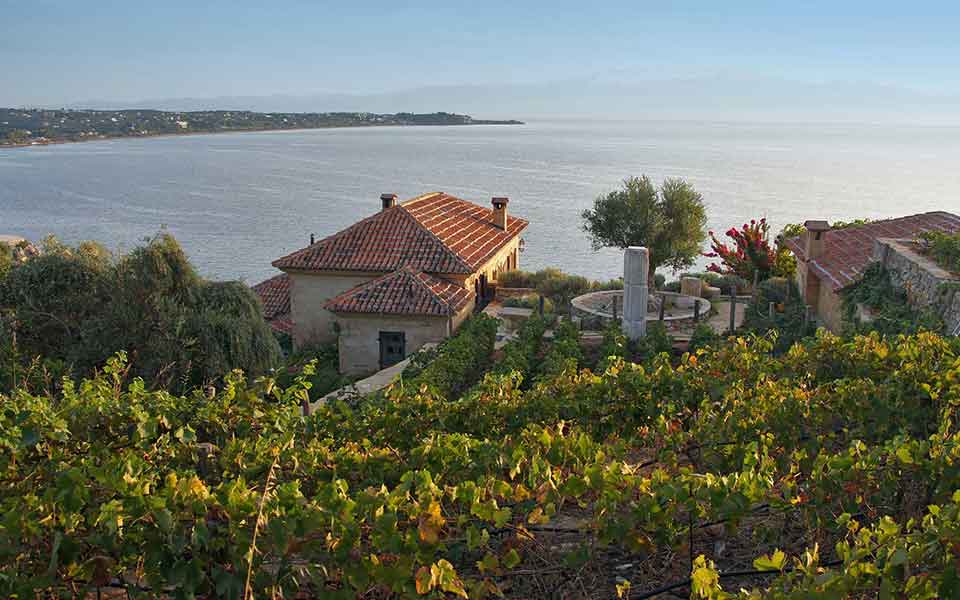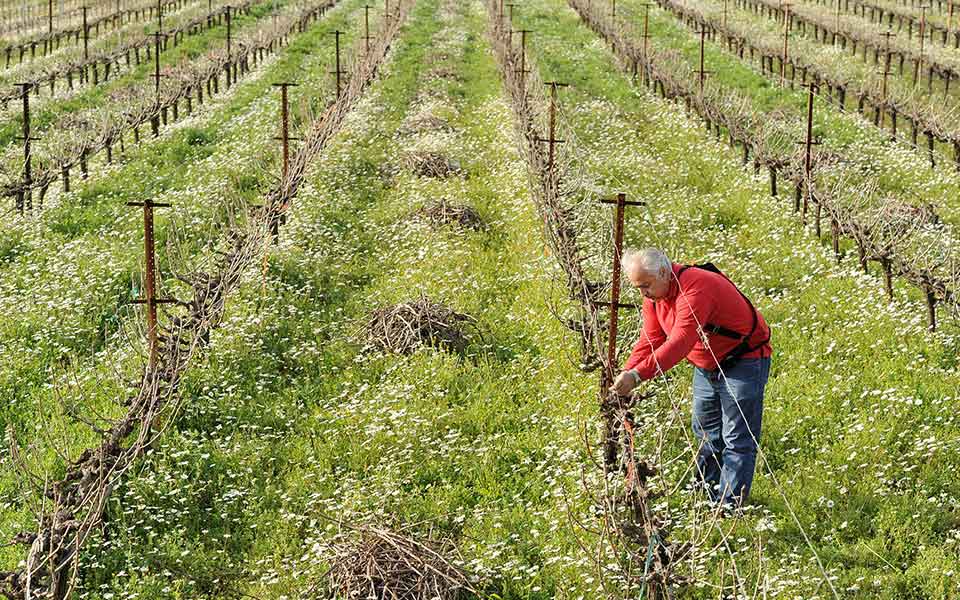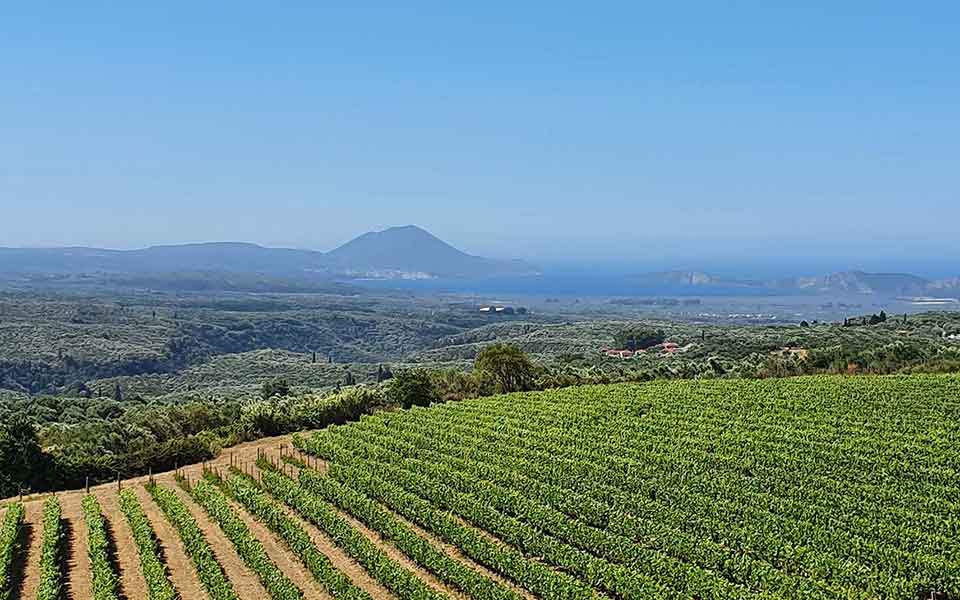Viticulture and winemaking has been an integral part of Messinia’s heritage for centuries. As early as the Mycenaean period (c. 1750-1050 BC), Linear B tablets and archaeological discoveries at the Palace of Nestor at Pylos, including large storage jars and mixing bowls, testify to the social and economic importance of wine in the local region. In fact, writing in the 2nd century AD, Greek geographer Pausanias mentions that Mount Eva, in the heart of Messinia, took its name from the exclamation “Evoi” (or “Viva!” meaning “long life!” ) used in Dionysian rites and symposia.
A few weeks ago, a group of scholars, archaeologists and agronomists organized an expedition to the Taygetos region in the southern Peloponnese to identify and collect a local grape variety associated with the vines from the site of ancient Alagonia, near the modern town of Anatoliko; a wine that has its origins in hallowed antiquity.

By the 17th century, Messinia was associated with the production of raisins, a treasure that was widely exported overseas, while in the early 20th century large Greek wineries were active in the area of Gialova.
It was in 1954 when 800 Messinian viticulturists joined forces and founded the Agricultural-Winery Cooperative of Messinia “Nestor,” with the aim of collecting, standardizing and distributing the production of the entire prefecture of Messinia, while some years later, in 1980, viticulturists planted international varieties in the only terroir in the region. Chardonnay and Cabernet Sauvignon of Trifylia then obtained a Messinian “passport” and many of the local labels began to appear on store shelves around the world.
The many faces of the Messinian vineyard aim to highlight the Messinia Terroirs Wine Festival, the first festival that supports local producers and winemakers in a three-day event at Navarino Agora from September 29 to October 1.

The festival is the inaugural event of the Messinia Terroirs program, an initiative of the Captain Vassilis & Carmen Constantakopoulos Foundation that aims to promote the wines of Messinia and the multifaceted regeneration of a place deeply rooted in viticulture, historical heritage and culture. The area of Navarino Agora will be filled with wine producers and wine lovers, as well as visitors who want to taste the wines of Messinia.
Among the events is a masterclasses in Greek on Saturday, September 30 (15:45-17:45 & 18:00-20:00), entitled “Wine in Messinia, Past-Present-Future & Blind Tasting of the Emblematic Cabernet Sauvignon from Trifylia,” with instructor Dr. Stefanos Koundouras, Professor of Viticulture and Head of the Department of Agriculture at Aristotle University of Thessaloniki. Dr. Koundouras will discuss the long history of vine cultivation and wine production in Messinia, how it has been integral to the region’s economy and culture, and how it continues to play an important role today. Nikolas Yannopoulos DipWSET will present the emblematic Cabernet Sauvignon from Trifylia through a blind tasting, while on Sunday 1 October, 17:00-19:00 the distinguished sommelier will present a masterclass, again in Greek, entitled “The Hidden Treasures of Messinia.” This session will involve a tasting of three international varieties along with Greek wines produced from the same varieties, cultivated in the Messinian terroir.
There will also be seminars in English for foreign visitors, as well as wine painting programs for children and adults. In collaboration with Danaos, the film, “Bottle Shock,” will be screened in an open air cinema and there will be a live music program of classical and contemporary repertoire.
All shops, restaurants and delicatessens of Navarino Agora will participate in the festival with special offers, special menus and local dishes, which ideally accompany the producers’ wines, completing the tasty, gastronomic and cultural experience of the Messinia Terroirs Wine Festival.

Messinia Terroirs
The Messinia Terroirs program is an initiative of the Captain Vassilis & Carmen Constantakopoulos Foundation, which was founded in 2011 with the aim of establishing Messinia a model of sustainable rural development through the support and promotion of innovative creative actions.
The main objective of the program is to give new impetus to the wine sector in Messinia, to revive the glamour of its past, and to highlight not only the fascinating diversity of the region’s vineyards but also the multidimensional physiognomy of the place.
The charismatic terroirs of Messinia, noted for its special microclimate that favors the production of excellent wines, as well as its rich gastronomic tradition and long historical and cultural heritage in an environment of extraordinary natural beauty, create the conditions for it to be reborn as a wine-producing region with its own characteristic identity, and to be established as a wine tourism destination with the highest international standards.
The main contributor and sponsor for the promotion of local winemakers and the tasting of their wines is the new Cellier store at Navarino Agora. Cellier have created for the Festival a commemorative tasting glass, which will be made available from their store to the public for the tasting sessions, at a cost of 5 euros. When the glass is returned, the visitor will receive a discount of the same amount on the purchase of Messinian wines from the store’s collection.

© Katerina Kambiti
The producers who will participate in the Festival are:
1. Navarino Vineyards
2. Panagiotopoulos Wines
3. Nestor Winery
4. Psaroulis Winery
5. Dereskou Estate
6. Astir X (Xygoros)
7. Lacules Estate
8. Gotsis Winery
9. Patsouros Konstantinos – Oinemborikos Trifylias
10. BIOVIN – Tsavolakis Wines
More about the program can be found at www.cvf.gr.
This article was previously published in Greek at kathimerini.gr.












